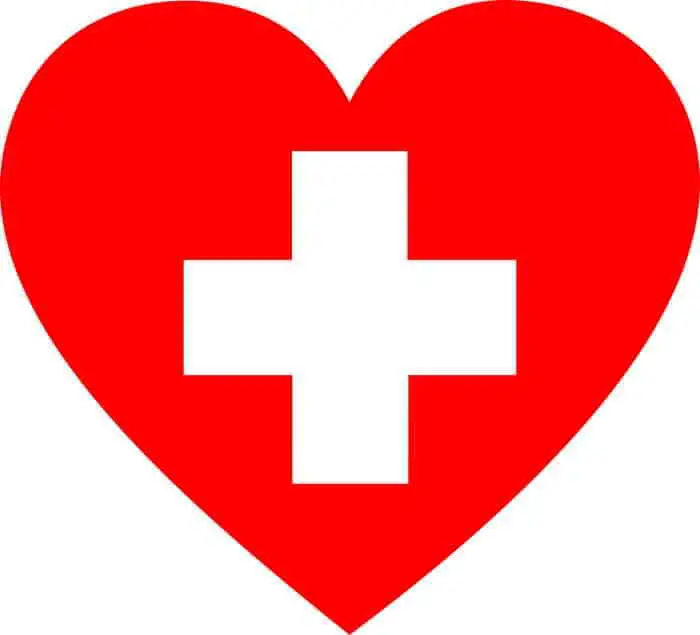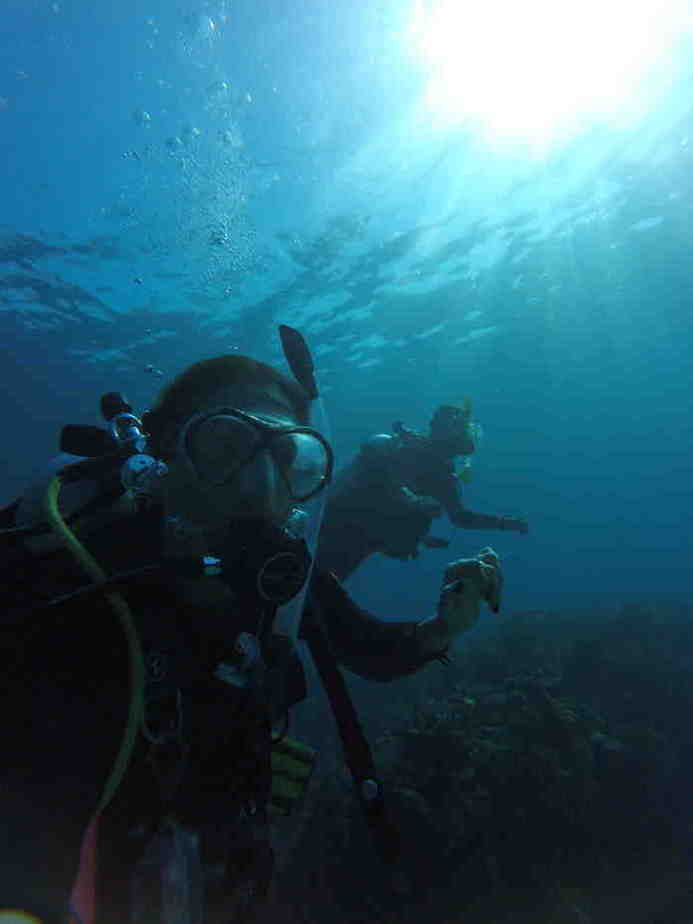- You are here:
- Home »
- Blog »
- Dive Deeper »
- Is freediving bad for you & your health? (& how to reduce the risks)
Is freediving bad for you & your health? (& how to reduce the risks)

Freediving is a world-renowned underwater sport. It attracts divers from all sorts of cultures and countries across the globe. But does it’s vast popularity mean freediving is safe? Or is there a chance freediving is bad for you and we all just turn a blind eye to it?
[Medical disclaimer: This post is not medical advice nor is the writer a qualified medical practitioner. It is a piece based on opinion and research gathered from other online sources. I recommend consulting a licenced physician for a definitive answer on the safety of freediving].Freediving is typically only bad for you if you’re not trained to hold your breath underwater for an extended period. When you’re overwhelmed by the lack of oxygen, your body’s natural mammalian-dive reflex will slow your heart rate and lower oxygen consumption until you resurface.
Divers often hold their breath too long when over-anticipating the distance they can swim underwater without proper breath training. Anything can happen underwater. There’s always a chance of you struggling to resurface, leading to blackouts. Keep reading to learn how you can do freediving safely.
How Can Freediving Affect You?
Breath-hold diving can be dangerous and even fatal if you don’t do it correctly.
Freediving can affect you with many dangerous health problems like oxygen deprivation and even blacking out. Dangers that come with freediving are why you must adhere to freediving safety guidelines.
There are many common effects of freediving. Whether you are a newbie diver just starting to submerge your fins in the water or a veteran diver who has hours under their belt, freediving can be dangerous.
Let’s take a look at the four ways freediving can be dangerous to you.
Freediving Can Cause Oxygen Deprivation
Oxygen deprivation is one of the most common effects of freediving. This is dangerous and can lead to serious medical problems.
Freediving can lead to a lack of oxygen and can be potentially deadly.
Beginners are the most common victims of oxygen deprivation because they’re untrained in long-term breath-holding. They accidentally overestimate the amount of time they can hold their breath and end up suffering from oxygen deprivation.
Medical problems from oxygen deprivation vary from blackouts to death. Before diving, ensure you’ve gone through the proper training with a freediving professional. Never dive by yourself, either.
Having a professional or a freediving veteran supervise your first few dives is highly recommended. Professional supervision can be life-saving if you face a medical emergency while free diving.
You Are at Risk of Pressure-Related Injuries
Pressure-related injuries are common in the freediving community. They occur in many forms like burst blood vessels in your eyes, ruptured eardrums, and many more.
Pressure-related injuries occur because you’re unable to equalize the water pressure, and an inability to adjust to the underwater pressure results in a suctioning effect. Your mask pulls in, and your vessels burst.
Seek medical attention, if necessary. Putting off medical attention for pressure-related injuries can lead to them becoming permanent.
It Can Cause Neurological Disorders
Life-long neurological disorders are one of the most serious effects of improper freediving. This is a very common deterrent for most people who have an interest in freediving. However, this can be avoided with proper attention and professional training.
Brain damage typically doesn’t go away with quick treatment, while medical treatment for neurological disorders can be very costly.
Neurological disorders that can develop due to freediving include:
- Epilepsy
- Memory loss
- Loss of motor function
- Addiction
You Can Get Hypothermia
Hypothermia can occur while freediving when you don’t wear the correct safety gear. You become in a state of hypothermic shock when you reach a body temperature below 95℉ (35℃).
Hypothermia occurs when you lose body heat quicker than you gain it, and it is caused by extended exposure to cold for long periods and often happens when you don’t wear a wetsuit while diving.
To avoid hypothermia, wear isothermal wetsuits, as they minimize heat transfer and help maintain body temperature even in the coldest water. Water that is too cold lowers body temperature, and therefore, it should be avoided as well.
The Health Effects of Oxygen Deprivation
Oxygen deprivation is dangerous to the freediving community because it can lead to health problems. Most of these happen because oxygen deprivation is long-lasting, and neurons in your brain die without oxygen.
Training can help freedivers build their stamina and breath-holding skills.
Over a steady course of time, divers train to ascend and descend successfully.
Extended oxygen deprivation can cause brain damage and even death. All freedivers should seek professional training before beginning their diving journey so that they can learn the proper methods for freediving to prevent irreversible neurological damage.
Many health effects come from oxygen deprivation. The most serious health effect of all is death.
Let’s talk more about the health effects of oxygen deprivation.
Brain Damage
Freediving can cause brain damage because holding your breath starves your brain of oxygen.
Without oxygen, you can easily suffer brain damage and lose control of critical cognitive functioning like speech and movement.
When you reach a certain excess of oxygen deprivation, your mammalian-dive reflex kicks in. This is an evolutionary response which slows your heart rate and lowers your oxygen consumption by directing oxygen-rich blood to vital organs.
The decrease of oxygen increases the amount of carbon dioxide levels in your blood, which is problematic because your brain uses 20% of your total oxygen supply. As your body begins to distribute more oxygen to other vital organs, your brain is deprived of oxygen.
Hypoxia Black Outs
Blackouts often happen as a result of oxygen deprivation. Although blackouts can be common, they shouldn’t be taken lightly.
Blacking out is also your body’s attempt to conserve the oxygen in your bloodstream. The lack of oxygen in your brain leads to vital organ preservation, and your body tenses as you flip like a switch.
When you blackout with a snorkel in your mouth, you run the risk of drowning. The snorkel acts as a funnel and will continue funneling water into your lungs until removed.
To prevent this, remove the snorkel from your mouth while diving down.
Blacking out can cause brain damage, because when you blackout, you are starving your brain of oxygen. Starvation continues until you reach the surface and begin breathing again.
Death
Death is, of course, the most serious result of oxygen deprivation. Whether physical or neurological, the lack of oxygen limits your body’s overall capabilities and then inevitably kills you.
Dying as a result of freediving isn’t common but does happen. It’s estimated approximately 100 people die from freediving each year. Proper training can prevent more people from dying from oxygen deprivation.
The body relies on oxygen, and without oxygen, it can’t function properly. Death often occurs when you have:
- Exceeded your body’s breath-hold capacity.
- Overestimated your depth abilities.
- Lose consciousness underwater for too long.
How To Free Dive Safely
As discussed, freediving can be dangerous and potentially life-threatening to an untrained diver. You must take the necessary precautions to ensure you’ll have a good experience with freediving.
Below are several tips on how to stay safe while freediving:
- Warm-up before you free dive.
- Wear a proper wetsuit, especially when the water is cold.
- Take freediving lessons.
- Don’t free dive alone, but rather go with a friend.
- Know your limits to avoid overdoing your dive.
- Stay within safe freediving depth, preferably with a buddy.
- Take a breath first before you resurface and don’t speak until you do.
- Train with a friend, always!

Just like scuba diving, freediving is much safer when done with a buddy.
Conclusion
There are several ways to prevent hypoxia blackout, but the best preventative measure is to educate freedivers about the dangers surrounding freediving. Free dive with a buddy whenever possible.
Freediving without proper training can be life-threatening due to oxygen deprivation. Amateur divers who don’t know breath-holding techniques will inevitably result in brain damage or fatality.
Pressure changes add increased risk to your dive, as the deeper you go, the more likely you are to become injured. Train yourself, know your depth limitations, and always descend/ascend at appropriate speeds to avoid injury.
If you’re injured, begin medical treatment immediately.
About the Author Gerrie van Niekerk - Apnealogy
Gerrie is a passionate Freediver, Spearfisher, Digital Marketer, and author for the Apnealogy website. Gerrie is an SSI Level 1 certified Freediver who loves geeking out about freediving and spearfishing gear and lives for his family and adventure.

